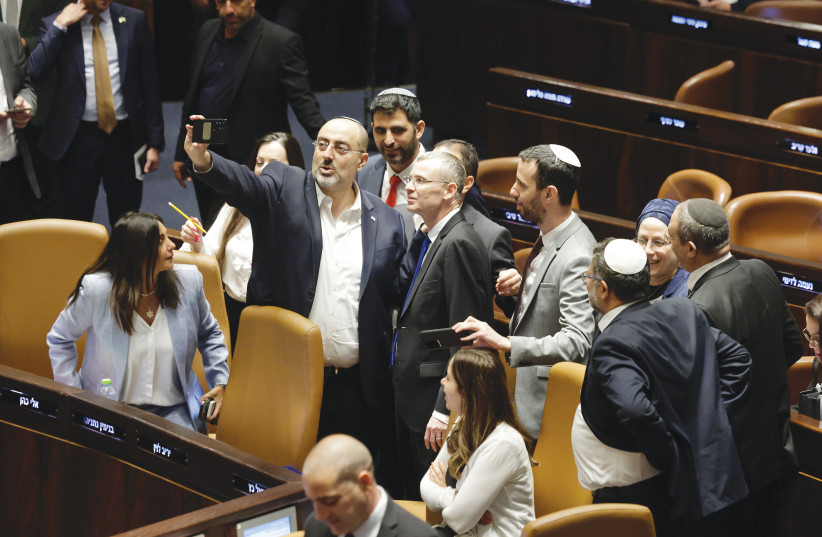Netanyahu to NBC: ‘There won’t be civil war’
Political unrest in Israel over the government’s judicial reform plan won’t lead to a civil war, Prime Minister Benjamin Netanyahu assured NBC in the latest in a series of interviews he has given to major American media outlets.
“There won’t be civil war – I guarantee you that,” Netanyahu said as he assured NBC correspondent Rafael Sanchez that his overhaul plan would strengthen the country’s democracy. Opponents of the plan, who have taken to the streets for the last weeks have wanted that it could transform Israel into a dictatorship.
“When the dust settles, people will see that Israel’s democracy has been strengthened and not weakened. .. People’s fears that have been stoked and whipped up I think will subside, and they’ll see that Israel is just as democratic as it was before and even more democratic,” Netanyahu said.
Correcting an ‘imbalance in Israel’s democracy’
The reform plan, he said, corrects an “imbalance in Israel’s democracy, where the judiciary has basically arrogated to itself nearly all the powers of the executive branch and the legislature.”
He spoke just one week after Israel’s Knesset passed the first leg of the judicial reform plan by 64-0, with the entire opposition of the 120-member body taking the unprecedented move to boycott the vote.
 COALITION MEMBERS take a selfie after the Law to Cancel the Reasonableness Standard passed on Monday in the Knesset. (credit: MARC ISRAEL SELLEM/THE JERUSALEM POST)
COALITION MEMBERS take a selfie after the Law to Cancel the Reasonableness Standard passed on Monday in the Knesset. (credit: MARC ISRAEL SELLEM/THE JERUSALEM POST)The bill curtailed some of the court’s powers by eliminating the clause that allowed the Supreme Court to reject government decisions on the basis of unreasonableness, a judicial tool that was used to combat political corruption.
Reviewing the law in September
Israel’s High Court is set to review the Law to Cancel the Reasonableness Standard on September 12 with an enlarged panel of 15 judges.
Netanyahu in his media interviews has not promised to abide by their decisions and has questioned the court’s legal right to hold that judicial review.
Sanchez took up that issue with Netanyahu asking “will you abide” by the court’s ruling on the law?
“Remember what I said I hope that they don’t strike it down,” Netanyahu said echoing a comment he made to CNN last week in which he explained that such a move would send the country into unchartered territory.
Netanyahu did clarify that Israeli governments should only abide by the High Court decisions but seemed to indicate that this did not hold with respect to basic law amendments passed by the Knesset.
“We have to follow two rules. One is, Israeli governments abide by the decisions of the Supreme Court. And at the same time, the supreme court respects the basic laws which are the closest thing we have to a constitution. I think we should keep both principles, and I hope we do,” he said.
He equated it to a situation in which the US Supreme Court charged with preserving the constitution would nullify a constitutional amendment=.
Such a move would be the equivalent of the US Supreme Court turning on itself, a move which “doesn’t make sense,” Netanyahu said, adding that he hoped it didn’t happen in Israel.
Legal expert Amir Fuchs, who is a senior researcher at the Israel Democracy Institute took issue with Netanyahu’s statements to the media that overturning a basic law amendment voted on by the Knesset by a majority of 64 out of 120, was outside the court’s purview.
If that were correct, he said, then the Knesset would have unlimited power and in a democracy “no authority should be unlimited.”
It has been the case in the country’s history that the Supreme Court has not overturned basic law amendments, Fuchs said. The court has stated that it has the power to do so when a basic law amendment runs counter to the core values of the state, such as issues relating to democracy or its ethnic national identity as a Jewish country, Fuchs explained.
He also took issue with the comparison Netanyahu has made between basic laws and amendments to the US Constitution.
US Constitutional amendments are rare, whereas the Knesset frequently amends the basic laws, noting that there have been at least 60 such amendments in the last 23 years, Fuchs said.. US Constitutional amendments also require two-thirds votes of both the House and the Senate, whereas here one is looking at votes taken by a simple vote of one parliamentary house, the Knesset he added.





Comments are closed.